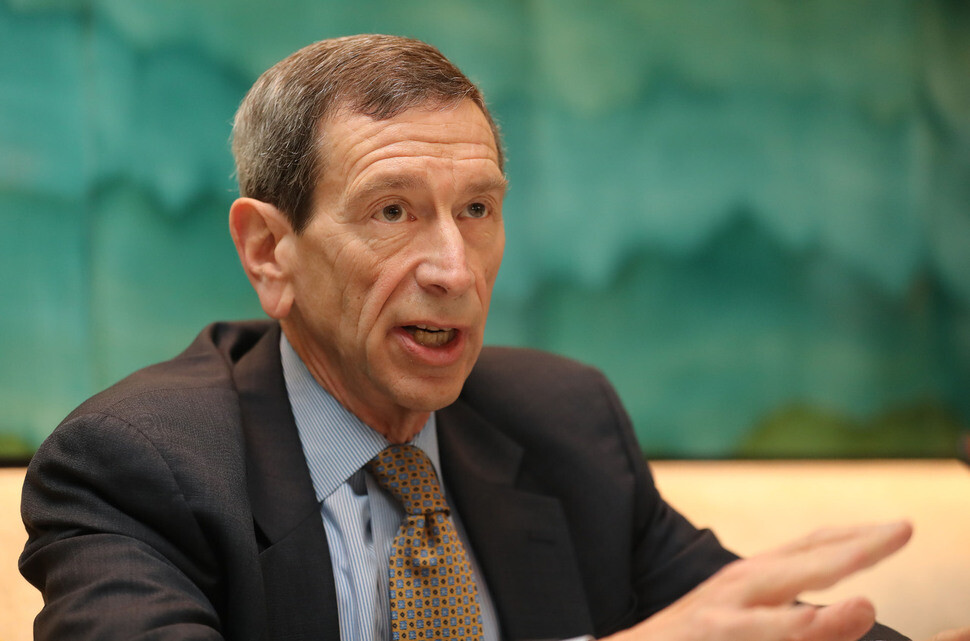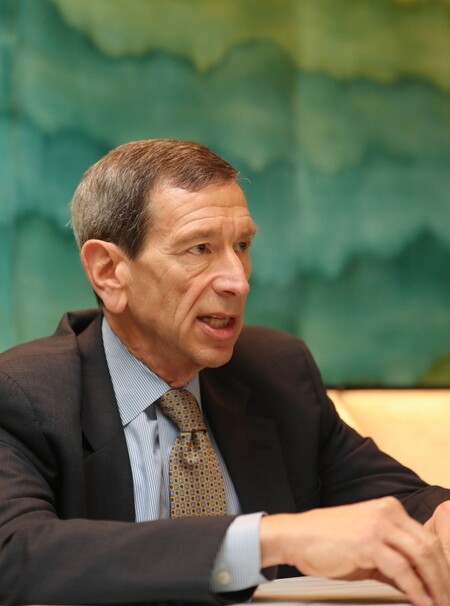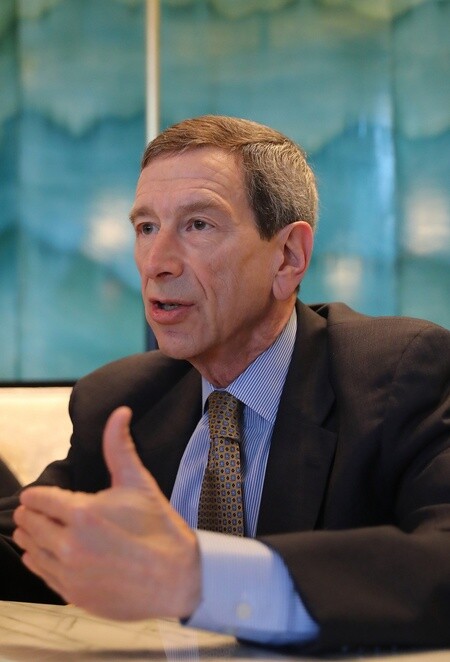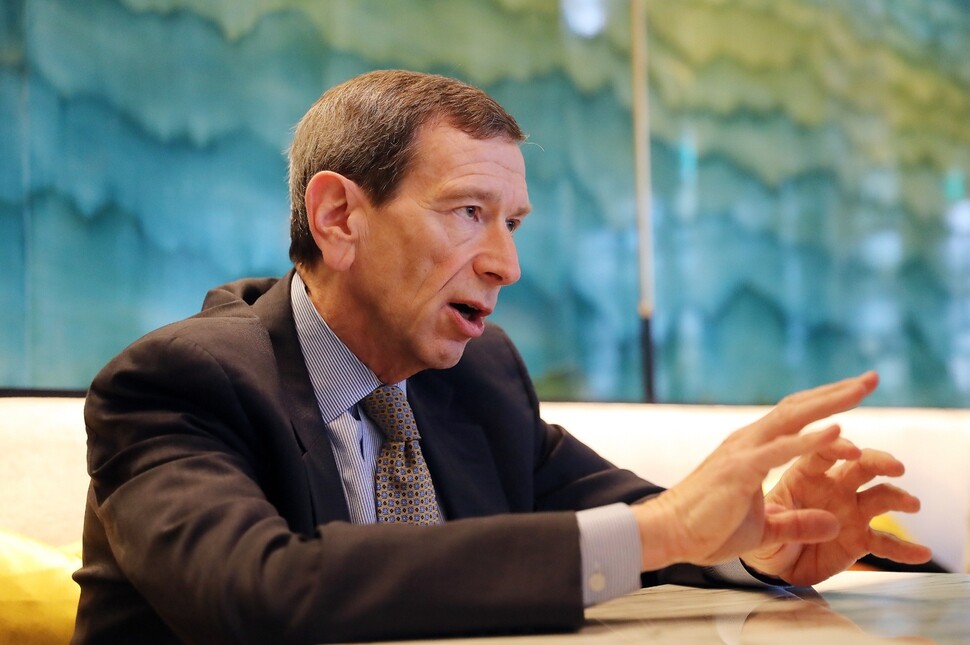hankyoreh
Links to other country sites 다른 나라 사이트 링크
[Interview] US non-proliferation expert proposes roadmap with reciprocal benefits for NK-US denuclearization talks

Robert Einhorn is a senior fellow in the Arms Control and Non-Proliferation Initiative and the Center for 21st Century Security and Intelligence as well as the US State Department’s former Special Advisor for Nonproliferation and Arms Control. The Hankyoreh managed to interview Einhorn during his visit to South Korea for the 17th Republic of Korea-United Nations Joint Conference on Disarmament and Non-proliferation Issues, which was held at the Shilla Hotel in Jeju from December 5 to 6.
The Hankyoreh met with Einhorn Dec. 3.
Hani: What do you make of the current deadlock in negotiations?
Einhorn: I don’t think this indicates that North Korea has given up on negotiating with the US. I think North Korea believes that their best interlocutor is President Trump. I think they believe that he is more flexible than any of his senior advisors. So, they have decided at least recently not to engage at even the Secretary Pompeo level and not to engage with Steve Beigun at a professional level. I think this is a mistake by North Korea.
They may believe that the US is prepared to go directly to the summit level without preparation, but that would be a miscalculation. I think it is important that a second Trump-Kim summit achieve concrete results and I think the US learned from the Singapore summit that summit meetings have to be well prepared if they are to receive concrete results, and that cannot be done unless there is engagement at the professional level. So hopefully North Korea will come to recognize that it has to meet both at the Pompeo level and at the Steve Beigun level.
Hani: North Korea has dismantled its facilities at the villages of Tongchang and Punggye. If the US provides corresponding measures, they’ve indicated their willingness to dismantle their Yongbyon facilities, but the US hasn’t responded to this proposal.
Einhorn: I think that the rewards that each side has provided today have been modest. And what North Korea has done is worthwhile, especially the suspension of nuclear tests and flight tests of long range missiles. But all the steps they have taken are reversible and they are not an indication of sincerity about denuclearization. And President Trump has taken important steps already including the suspension of joint military exercises, which was a huge step.
But what is important is not what has been done but what is going to happen, and they’re not going to know that until they engage at the professional level.
Hani: How can we begin a process of mutual trust building?
Einhorn: I think it’s not a question of the US telling South Korea what to tell North Korea. The answer is for the US and DPRK to sit down together and talk. Of course what the US talks about will have to be worked out in advance with the ROK government, but I think direct engagement is essential. But I think it would be important for the Trump administration to be more flexible in how it approaches North Korea. It’s taken the view that North Korea must move far down the path toward denuclearization before Washington can provide substantial rewards.
I think this is not a framework that the North Koreans are comfortable with. The North Koreans would like to see step by step progress with reciprocal benefits in each step of the way. I think it would be a positive thing if the US came with a kind of roadmap which demonstrates step by step progress with reciprocal benefits. Washington can decide which benefits would be provided every step of the way. And if North Korea’s steps toward denuclearization are not very impressive then Washington doesn’t need to make generous concessions. But I think getting to a framework that the North Koreans understand and are comfortable with would move the negotiations move forward.
Potential first step a declaration of all facilities producing fissile material

Hani: You have suggested a partial declaration of North Korea’s facilities as an initial step.
Einhorn: I don’t think it’s constructive for the US to insist as a first step that the North Koreans provide a complete declaration of the numbers and locations of its nuclear weapons, materials and missiles. I don’t think that there’s any reason to believe that the North Koreans could accept that. I think we need to move step by step and we should insist upon declarations appropriate to each step along the way.
For example, if we made a proposal for North Korea to suspend all production of fissile materials then it would be appropriate to ask for a declaration of all facilities in North Korea that‘s producing fissile material. This would be a partial declaration. It wouldn’t be asking from the outset that it declare all of its nuclear weapons and so forth. But it would be a declaration appropriate to a limited measure, and I think that’s a more constructive approach rather than to seek from the very beginning a complete denuclearization, which we know North Korea is not prepared to give.
Hani: So what would be a concrete first step?
Einhorn: An important first step would be a combination of continued suspension of nuclear testing and missile flight testing together with a declaration and suspension of all fissile material production activities anywhere. And not just in Yongbyon. I know that the North Koreans have suggested that they would suspend activities at Yongbyon in exchange for corresponding steps by the US, but I don’t think that’s enough because we already know that North Korea is producing fissile materials outside of Yongbyon.
So at the beginning of the year Kim Jong-un said that North Korea could proceed with the mass production of nuclear weapons and missiles. Even if they shut down Yongbyon verifiably, they could still be mass producing nuclear weapons and missiles, and I think we have to insist on a measure that is broader than just Yongbyon

Hani: Do you think North Korea would accept that?
Einhorn: If we agreed on an interim step that essentially capped North Korea’s nuclear capabilities and a ban on a fissile material productions would cap their nuclear capabilities, that would be an important step. But it would not require that they give up the nuclear deterrent. In other words, it wouldn’t require them at this stage to give up what they had already produced, so they should be more comfortable with that. Because they wouldn’t be asked to give up their deterrence right away.
Now, any agreement along the lines of the interim agreement that I’m suggesting should also contain a commitment by North Korea to continue negotiations towards complete denuclearization. Neither the US nor the ROK can accept a North Korea with nuclear weapons forever. There has to be a commitment to continue negotiations toward complete denuclearization. But with an interim measure they would saying no more while temporarily holding onto what has been produced so far, until till we proceeded toward complete denuclearization. So that’s why North Korea could perhaps accept that kind of cap, because for the time being they would retain their deterrent.
”Cap and reduce” next potential step after declaration
Hani: Sounds reminiscent of the six-party talks.
Einhorn: Sort of. Freezing meant they would freeze the amount of fissile material they had already produced. They would start by suspending on nuclear weapon tests in a way they would freeze the technology or nuclear warheads. They would freeze their missile capabilities because they wouldn’t have a chance to conduct flight tests that could improve the reliability or accuracy, so they would have to accept certain limitations
Hani: What would happen after the declaration?
Einhorn: Then there could be the beginning of reductions. You cap the capability and then maybe the North Koreans agree to turn over some of the nuclear weapons and fissile materials to some international authorities. So cap and then reduce. I think that’s the next stage. Also, if they have suspended production of fissile materials, to make that irreversible they could decommission or dismantle those facilities that are engaged in producing them.
Ensuring the dismantlement of suspect facilities outside Yongbyon

Hani: What sort of process would there be to confirm their declaration?
Einhorn: Yes. North Korea would have to provide declarations of the facilities engaged in some material production anywhere within their borders, and not just in Yongbyon -- facilities that they have not yet declared. Then the US, ROK and others would compare that declaration to our own assessments and intelligence. Maybe they don’t declare everything. Let’s say we see something that they haven’t declared. There has to be a procedure we can fall back on, where we go back to the North Koreans and request a visit to a suspected facility maybe by the US, ROK or even China. Maybe it would be the IAEA. They would probably be the best because that’s their job.
Hani: Why not offer sanctions relief in exchange for dismantling Yongbyon?
Einhorn: Let me ask you. So the North Koreans say that they will suspend Yongbyon but you have to provide corresponding measures. Let’s say they ask for sanctions relief in exchange. Imagine somebody in the Trump administration going to Congress and announcing that we’re going to provide sanctions relief to North Korea for shutting down Yongbyon. And some member of Congress says, “Can you guarantee that they are not producing fissile material elsewhere?” That person would have to say, ‘I cannot guarantee that. Actually, I can probably guarantee that they are producing outside of Yongbyon.”
Then it becomes hard to justify sanctions relief if they have not really stopped producing fissile material. That’s why I think the initial stage has to be broad and comprehensive so that we are really capping their nuclear capability. If you only dealt with Yongbyon you could not seriously say that you’re capping their capability
Hani: That doesn’t seem like something the North would accept.
Einhorn: I know. But if I were a negotiator I would say we could have called for complete denuclearization right away but we’re not. I would say let’s be satisfied for the time being with the interim measure, and lets defer complete denuclearization. We’re doing you a favor. We’re not getting rid of your deterrent right away, so you can keep it for the time being, but in exchange for our concession on immediate and complete denuclearization, we’re asking that you make a comprehensive suspension of your fissile material production. If you’re not willing to do that, then I suspect that you are determined to continue to producing fissile material and missiles, and so forth. I think it’s legitimate for us to ask for that.
Trump admin. needs to show more flexibility
Hani: So when is it realistic to expect mutual trust building?
Einhorn: I think the sides have to sit down and talk about a road map and their three key objectives from the Singapore statement: peace on the Peninsula, normalization of US-DPRK relations, and denuclearization. We should have a road map that proceeds to make progress on each of those elements in parallel, and I think we have to sit down with the North Koreans and talk about that kind of a road map.
That way, the North Koreans see where we’re going and they see the steps they take toward denuclearization would be matched by steps taken toward normalization of US-North Korea relations, which must include sanctions relief, steps toward a peace regime on the Korean Peninsula, which presumably will involve a declaration to end the war, and so forth. Present this whole road map, and I think the North Koreans will see that the US is prepared to move in a balanced way. I don’t think that is the position at this stage of the Trump administration but I think it’s important for the Trump administration to show more flexibility.
Hani: How important is it to maintain sanctions?
Einhorn: I think sanctions provide a strong motivation for North Korea to move down the path of denuclearization, so I am not in favor in simply giving up on sanctions I think we have to maintain them. But we shouldn’t say that North Korea has to finish denuclearization before we begin sanctions relief. I think we can begin sanctions relief earlier, and we’re already beginning in a certain way. For example, in the US agreed to the joint survey of the North-South rail links. So I think one could consider step by step exceptions to the existing sanctions regime as progress is made
Hani: What about exceptions for humanitarian aid?
Einhorn: I think that we should be prepared to do that. We should look at the global sanctions regime and decide areas where we can give genuine benefits to North Korea and its people without reducing our leverage to motivate the government to continue down the road to denuclearization

Serious negotiating process desirable before 2nd N. Korea-US summit
Hani: What role can South Korea play?
Einhorn: I think if there’s a fourth ROK-DPRK summit before a second US-DPRK summit, President Moon should tell Kim Jong-un that he should direct his people to sit down and meet with the Americans. It is counterproductive for Kim and North Korea to refuse to meet with Secretary Pompeo and Steve Beigun, and President Moon needs to tell Kim that if the inter-Korean agenda is to make progress and then the denuclearization agenda has to make progress. Also, it would be very difficult for President Moon to provide assistance to North Korea if the denuclearization process is stalled. The first step is for the North to meet with US officials.
Hani: What sort of goals should be set for the second North Korea-US summit?
Einhorn: They should not settle for vague generalities like in Singapore. They need to begin to get a serious negotiating process underway. Perhaps there could be some gestures that they can take some concrete steps on both sides. But I think just as important as tangible steps is beginning a serious negotiating process, because we haven’t had one since Singapore.
Hani: Do you think the North has shown sincerity in abandoning nuclearization for economic development?
Einhorn: No, I don’t think there has been any change. I don’t think they will ever plan to complete denuclearization without the proper motivation. There has been change in their rhetoric in trying to persuade President Moon that they are serious about denuclearization, but I am skeptical about that
Trilateral working group recommended for building peace on Korean Peninsula
Hani: What other concessions are possible?
Einhorn: I think it is likely that the United States and ROK will scale back the scope of Foal Eagle and perhaps also delay the initiation of the exercise. I think these modifications are consistent with the commitment President Trump provided at the Singapore summit and should not cause concern on the part of North Korea.
Hani: What about ending the Korean War and ensuring peace on the Korean Peninsula?
Einhorn: A first step on building peace on the Korean Peninsula might be a working group, involving perhaps the United States, the ROK, and North Korea, to consider steps to enhance stability on the peninsula and build mutual trust. Among such steps might be military confidence-building measures and a statement of intention to end the state of war on the Peninsula.
Hani: How could we begin normalizing relations between the US and North Korea?
Einhorn: An appropriate step in the normalization of US-DPRK relations might be to establish liaison offices in the capitals of each country.
By Kim Ji-eun, staff reporter
Please direct comments or questions to [english@hani.co.kr]
Editorial・opinion
![[Column] Has Korea, too, crossed the Rubicon on China? [Column] Has Korea, too, crossed the Rubicon on China?](https://flexible.img.hani.co.kr/flexible/normal/500/300/imgdb/original/2024/0419/9317135153409185.jpg) [Column] Has Korea, too, crossed the Rubicon on China?
[Column] Has Korea, too, crossed the Rubicon on China?![[Correspondent’s column] In Japan’s alliance with US, echoes of its past alliances with UK [Correspondent’s column] In Japan’s alliance with US, echoes of its past alliances with UK](https://flexible.img.hani.co.kr/flexible/normal/500/300/imgdb/original/2024/0419/2317135166563519.jpg) [Correspondent’s column] In Japan’s alliance with US, echoes of its past alliances with UK
[Correspondent’s column] In Japan’s alliance with US, echoes of its past alliances with UK- [Editorial] Does Yoon think the Korean public is wrong?
- [Editorial] As it bolsters its alliance with US, Japan must be accountable for past
- [Guest essay] Amending the Constitution is Yoon’s key to leaving office in public’s good graces
- [Editorial] 10 years on, lessons of Sewol tragedy must never be forgotten
- [Column] A death blow to Korea’s prosecutor politics
- [Correspondent’s column] The US and the end of Japanese pacifism
- [Guest essay] How Korea turned its trainee doctors into monsters
- [Guest essay] As someone who helped forge Seoul-Moscow ties, their status today troubles me
Most viewed articles
- 1[Column] The clock is ticking for Korea’s first lady
- 2Samsung barricades office as unionized workers strike for better conditions
- 3After 2 months of delayed, denied medical care, Koreans worry worst may be yet to come
- 4[Correspondent’s column] In Japan’s alliance with US, echoes of its past alliances with UK
- 5[Column] Has Korea, too, crossed the Rubicon on China?
- 6Hong Se-hwa, voice for tolerance whose memoir of exile touched a chord, dies at 76
- 7[Photo] Smile ambassador, you’re on camera
- 8All eyes on Xiaomi after it pulls off EV that Apple couldn’t
- 9[Guest essay] How Korea turned its trainee doctors into monsters
- 10US overtakes China as Korea’s top export market, prompting trade sanction jitters